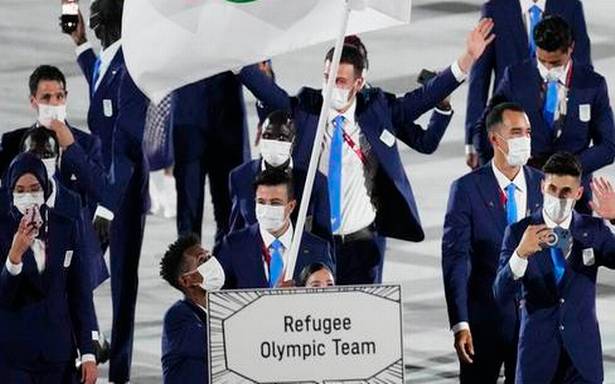As many as 29 men and women from different countries are participating in the Tokyo Olympics under one banner. Who are they and why aren’t they representing their own nations?
When 23-year-old Kimia Alizadeh stunned two-time Olympic champion Jade Jones, it was a new chapter not only for Taekwondo, but a ray of hope for millions around the world. She narrowly missed a medal in the Tokyo Olympics, but the Iran-born player has nevertheless scripted history. The daughter of a tablecloth maker in Karaj, Iran, Alizadeh currently lives with her husband in Germany. She describes herself as ‘one of the millions of oppressed women in Iran.’
Alizadeh is among 29 athletes participating under the banner Refugee Olympic Team. These members come from 11 countries – Afghanistan, Cameroon, Democratic Republic of Congo, Eritrea, Iran, Iraq, South Sudan, Sudan, Syria, the Republic of Congo and Venezuela. The athletes have lived and trained on foreign soil; in the territories of 13 host countries — Austria, Belgium, Brazil, Canada, France, Germany, Israel, Kenya, Portugal, the Netherlands, Trinidad and Tobago, Switzerland and the United Kingdom. Olympian and former marathon world record-holder Tegla Loroupe of Kenya is the team’s Chef de Mission at the 2020 Tokyo Olympics.
In Tokyo, they are competing in 12 sports: athletics, badminton, boxing, canoeing, cycling, judo, karate taekwondo, shooting sport, swimming, weightlifting and wrestling.
How did this team come to be?
In a first, 10 refugee athletes from four countries competed with athletes from other nations at the 2016 Summer Games in Rio de Janeiro.
At the UN General Assembly in 2015, at the brink of a global refugee crisis, International Olympic Community (IOC) President Thomas Bach announced the creation of a Refugee Olympic Team. Essentially, the team would comprise only refugees.
According to Mr. Bach, “This will be a symbol of hope for all refugees in the world and will make the world better aware of the magnitude of this crisis. It is also a signal to the international community that refugees are our fellow human beings and are an enrichment to society.”
Most of the players have suffered a complete erasure of their geo-political identities. Further, refugee athletes have experienced loss, dispossession, exile and therefore locate themselves at critical intersections. At this precarious juncture, the formulation of such a team emerged as a second chance to reconstruct a deconstructed future. It was seen as a way to raise socio-political awareness about displaced people amongst citizens of the world.
Criteria for selection
The selection of athletes has been based on certain criteria. Firstly, the athlete’s sporting performance and refugee status is confirmed by UNHCR. Second, personal background, and a balanced representation in terms of region, gender and sport is considered.
Furthermore, the International Olympic Committee regulates that the 56 Refugee Athlete Scholarship holders must come from 21 host countries. IOC also states that the athletes must represent 12 sports: athletics, badminton, boxing, canoeing, cycling, judo, karate, taekwondo, sport of shooting, swimming, weightlifting, and wrestling.
How is it unique?
The Refugee Olympic Team’s official acronym is EOR, based on the French name: équipe olympique des réfugiés.
The Olympic flag shall be raised and the Olympic anthem shall be played at all official representations of the team including medal ceremonies.
Olivier Niamkey from the IOC and Stephen Pattison from UNHCR will both act as the Deputy Chefs de Mission.
During the Opening Ceremony of the 2020 Tokyo Olympics, the team marched with the Olympic flag in second position, immediately after Greece.
2020 Refugee Team and its members
Of the 29 athletes, 25 of them are Refugee Athlete Scholarship-holders and the remaining four athletes are from the International Judo Federation Refugee Project. Six athletes who took part in Rio Olympics are competing again this year.
The team comprises:
Abdullah Sediqi, Taekwondo (-68kg)
Ahmad Badreddin Wais, Cycling (time trial)
Aker Al Obaidi, Wrestling (Greco-Roman -67kg)
Alaa Maso, Swimming (freestyle 50m)
Angelina Nadai Lohalith OLY, Athletics (1500m)
Aram Mahmoud, Badminton (Singles)
Cyrille Fagat Tchatchet II, Weightlifting (-96kg)
Dina Pouryounes Langeroudi, Taekwondo (-49kg)
Dorian Kalatela, Athletics (100m)
Eldric Sella Rodriguez, Boxing (-75kg)
Hamoon Derafshipoour, Karate (-67kg)
Jamal Abdelmaji Eisa, Athletics (5000m)
-James Nyak Chiengjiek , Athletics (400m)
Kimia Alizadeh, Taekwondo (57kg)
Luna Solomon, sport of Shooting (air rifle 10m)
Masomah Ali Zada, Cycling (time trial)
Paulo Amotun Lokoro, Athletics (1500m)
Popole Misenga , Judo (-90kg and mixed team)
Rose Lokonyen Nathike , Athletics (800m)
Saeid Fazoula, Canoeing (500m)
Sanda Aldass, Judo (-57kg)
Tachlowini Gabriyesos, Athletics (Marathon)
Wael Shueb, Karate (Kata)
Wessam Salamana , Boxing (-57kg)
Yusra Mardini, Swimming (100m butterfly and freestyle)
Source: Read Full Article

